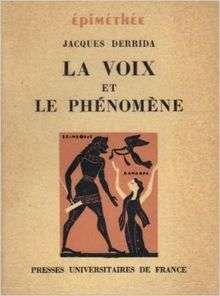Speech and Phenomena
 Cover of the first edition | |
| Author | Jacques Derrida |
|---|---|
| Original title | La Voix et le Phénomène |
| Translator |
David B. Allison Leonard Lawlor |
| Country | France |
| Language | French |
| Subject | Edmund Husserl |
| Publisher | Presses Universitaires de France |
Publication date | 1967 |
Published in English | 1973 |
| Media type | |
| Pages | 166 (English translation) |
| ISBN | 0-8101-0590-X |
| LC Class | 72-80565 |
Speech and Phenomena: And Other Essays on Husserl's Theory of Signs, or Voice and Phenomenon: Introduction to the Problem of the Sign in Husserl's Phenomenology,[1] (French: La Voix et le Phénomène) is a book about the phenomenology of Edmund Husserl by French philosopher Jacques Derrida, published in 1967 alongside Derrida's Of Grammatology and Writing and Difference. In Speech and Phenomena, Derrida articulates his mature relationship to Husserl, putting forward an argument concerning Husserl's phenomenological project as a whole in relation to a key distinction in Husserl's theory of language in the Logical Investigations (1900-1901) and how this distinction relates to his description of internal time consciousness. Derrida also develops key discussions of the terms deconstruction and différance. Derrida commented that Speech and Phenomena is the "essay I value the most".[2] Derrida's best known work on Husserl's phenomenology, it is widely considered one of his most important philosophical works.
Background
Speech and Phenomena is the culmination of a long period of study on the phenomenology of Edmund Husserl that Derrida began with his 1953/54 masters thesis The Problem of Genesis in Husserl's Phenomenology. This early thesis then formed the basis for his 1959 paper "'Genesis and Structure' and Phenomenology."[3] Derrida also translated Husserl's "Origin of Geometry" from German into French and published his translation of this article with a book length introduction in 1962.
Structure
Speech and Phenomena consists of an introduction and seven chapters: (1) Sign and Signs, (2) The Reduction of Indication, (3) Meaning as Soliloquy, (4) Meaning and Representation, (5) Signs and the Blink of an Eye, (6) The Voice that Keeps Silence, (7) The Supplement of Origin.
1. Sign and Signs
Derrida identifies his theme in the first chapter as the twofold sense of the word sign for Husserl. Derrida notes that Husserl makes a conceptual distinction in the use of the word sign between expression and indication.[4] For Husserl, Derrida argues, the expression and the indication are both signs but the latter is a sign without meaning or sense.[5] Expression intends towards an ideal meaning and is "tied to the possibility of spoken language."[6]
Translations
Originally translated into English by David B. Allison and published as Speech and Phenomena: And Other Essays on Husserl's Theory of Signs in 1973, a new translation by Leonard Lawlor under the title Voice and Phenomenon: Introduction to the Problem of the Sign in Husserl's Phenomenology was published in 2010.[1]
Commentary
For commentary on Speech and Phenomena see Leonard Lawlor's book Derrida and Husserl (2002) and Joshua Kates's book Essential History (2005).
See also
Notes and references
- 1 2 http://www.nupress.northwestern.edu/content/voice-and-phenomenon
- ↑ Derrida, J., 1981. Positions. Trans. A. Bass. Chicago: Chicago UP, p. 13.
- ↑ Joshua Kates states that the 1959 paper "turns out largely to be a précis of this earlier work." (Essential History, 84)
- ↑ "Husserl Begins by pointing out a confusion: The word 'sign' (Zeichen) covers, always in ordinary language and occasionally in philosophical language, two heterogeneous concepts: that of expression (Ausdruck), which is often wrongly taken as a synonym for sign in general, and that of indication (Anzeichen)." (Derrida, Speech and Phenomena 17)
- ↑ "But, according to Husserl, there are signs that express nothing because they convey nothing one could call (we still have to put it in German) Bedeutung of Sinn. Such is the indicative sign [indice]. Certainly an indicative sign is a sign, as is an expression. But, unlike an expression, an indicative sign is deprived of Bedeutung or Sinn; it is bedeutunglos, sinnlos. But, nonetheless, it is not without signification. By definition there can be no sign without signification, no signifying without the signified." (Derrida, Speech and Phenomena 17)
- ↑ (Derrida, Speech and Phenomena 18) also, "One would thus be assured that the meaning (Beudeutung) is always what a discourse or somebody wants to say ': what is conveyed, then, is always a linguistic sense, a discursive content" (Derrida, Speech and Phenomena 18)